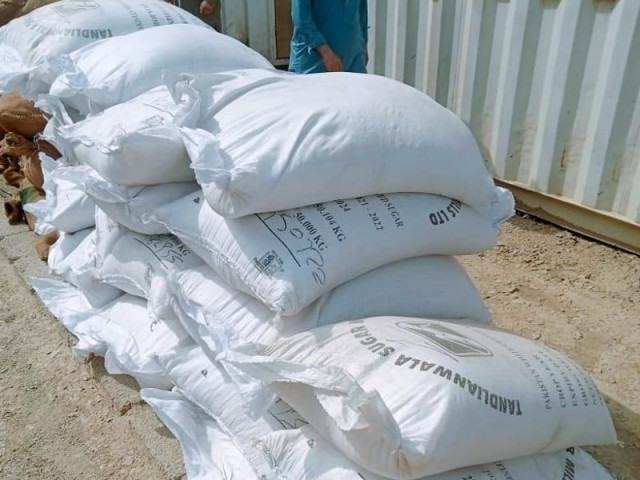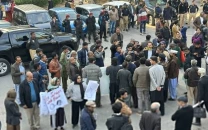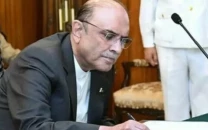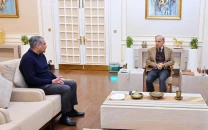PML-N, PPP trade barbs over sugar crisis
Iqbal lays blame at PPP's door; Qamar hits back

As the sugar crisis grips the nation, two main political parties who were part of the last coalition government led by Shehbaz Sharif on Monday pointed fingers at each other over the matter and the alarming rise in prices across the country, tossing around the blame as consumers grapple with skyrocketing costs.
Former planning minister Ahsan Iqbal shifted the blame onto former commerce minister and Pakistan Peoples Party (PPP) leader Naveed Qamar, asserting that the latter should be held accountable for the crisis.
He laid the blame squarely on the former commerce minister’s doors who, he claimed, had taken the decision that led to the current sugar crisis.
Read PM Kakar says Saudi Arabia to invest $25b over next five years
He further stressed that Qamar needed to clarify his stance on the current crisis as he was at the helm of the affair, and asserted that the Pakistan Muslim League-Nawaz (PML-N) cannot be held responsible for every decision made by the coalition government.
On the other hand, Qamar hit back and defended himself, arguing that the decision was collectively made by the Economic Coordination Committee and approved by the cabinet.
He revealed that there was an excess stock of sugar, three times more than the amount allowed for export. “The responsibility does not lie solely with the commerce ministry, as the decision was approved by the ECC and the cabinet.
Meanwhile, PPP’s official media group also release a tweet of Senator Taj Haider, stating that Qamar had allowed sugar export to help the then finance minister Ishaq Dar with some foreign exchange. Haider alleged that the ex-interior minister Rana Sanaullah had allowed smuggling of sugar, saying dollars were earned by smugglers but Iqbal simply blames Qamar.
“Mr Naveed Qamar allowed official export of 250,000 tons sugar to help Mr Dar with some Foreign exchange,” Haider stated in a post on X, formerly known as Twitter. “Honourable Rana Sanaullah allowed 1.4 million tons sugar to be smuggled,” he added, “Dollars were earned by smugglers. But Mr. Ahsan Iqbal holds Mr. Naveed Qamar responsible.”
Sugar price exceeds Rs200
As the war of words rages, the recent surge in the petroleum product prices has unleashed an alarming wave of inflation as within just two days, the cost of essential commodities, particularly sugar and flour, has skyrocketed, leaving citizens grappling with exorbitant prices.
The government, in response, has authorised the import of sugar to alleviate the crisis. The price of sugar, in particular, has spiralled out of control, witnessing a staggering increase of Rs20 per kg in just 48 hours. It is now being sold for over Rs200, while a 50 kg bag has crossed the Rs10,000 mark.
In Peshawar, the sweetener is being retailed at a shocking Rs220 per kg, heightening concerns. Flour prices have also surged, with an 80 kg sack now being sold at Rs11,500, while a 20 kg bag has stood at Rs2900.
Read More Time for caretakers to take care of rupee
Sugar dealers are predicting further instability, claiming that if the situation is not brought under control promptly, it could even reach Rs250 per kg.
As a consequence of the surging sugar prices, bakery items are likely to witness a surge in their own costs, creating additional hardships for consumers across the board.
In response to escalating flour prices, traditional bakers in Peshawar, known as 'nanbaies,' have demanded an increase in bread's price, reducing its weight. The flour industry has also joined the hike bandwagon, selling old stock at new prices, further burdening the consumers.
The repercussions of the crisis have not spared Karachi as well, where sugar prices have spiked by Rs50 per kg in just one week, resulting in a 50 kg sack being sold for over Rs9000.
Accessibility issues have surfaced as sugar availability in most utility stores has dwindled, forcing citizens to pay inflated prices for the scarce commodity.
Meanwhile, prices of other food essentials such as flour, ghee, rice, tea, and pulses have surged significantly, adding to the plight of the public.
In Quetta, the scarcity of sugar has hit an all-time high, with retail prices soaring to Rs220 per kg, as shopkeepers struggle to meet the demand.



















COMMENTS
Comments are moderated and generally will be posted if they are on-topic and not abusive.
For more information, please see our Comments FAQ